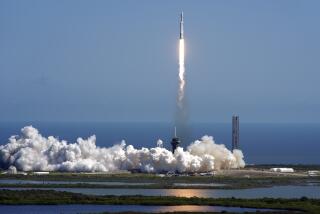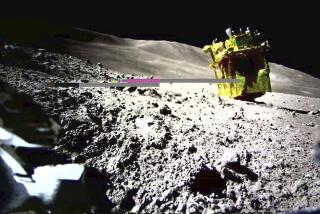Comet Probe Rosetta Finally Takes Flight
- Share via
DARMSTADT, Germany — A European rocket blasted off Tuesday on a pioneering 10-year journey to land a probe on a comet and search for clues to the origins of the solar system.
The Rosetta spacecraft soared into the skies above South America aboard an Ariane-5 rocket from Kourou, French Guiana. The European Space Agency had scrubbed two scheduled launches last week.
After a final countdown, mission control workers in Darmstadt, outside Frankfurt, stared intently into their monitors as the rocket took off.
About 15 minutes into the mission, European Space Agency officials said the rocket had successfully reached orbit.
Rosetta is expected to reach a comet called Churyumov-Gerasimenko in May 2014. It is supposed to orbit the comet before releasing a lander that will try to touch down on the icy surface of the comet’s nucleus. Previous spacecraft have made only brief fly-bys of comets.
Scientists hope that the mission will reveal clues about the birth of the sun and the planets. Comets are the solar system’s most primitive objects -- formed when it was still very young, more than 4.6 billion years ago.
A first launch attempt Thursday was scrapped because of high winds. The second attempt was abandoned Friday when a routine inspection found that a piece of insulating foam had fallen off the main booster stage -- raising fears that ice could form at the hole and break off, possibly damaging the rocket.
Rosetta was already more than a year behind schedule. The European Space Agency abandoned a January 2003 launch after another rocket in the Ariane-5 family veered off course and had to be destroyed.
More to Read
Sign up for Essential California
The most important California stories and recommendations in your inbox every morning.
You may occasionally receive promotional content from the Los Angeles Times.













